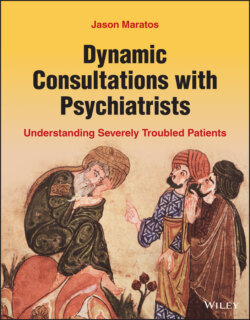Читать книгу Dynamic Consultations with Psychiatrists - Jason Maratos - Страница 25
Consultation
ОглавлениеThe consultation was started with the request to clarify a few points of history. Mrs. Z. started earning at the age of 14–15 years. She is obese with a body mass index (BMI) of 30. Her intelligence was considered to be slightly below average. She had undertaken semi‐skilled jobs. The siblings were “well off” with one sibling running their own business and a sister being a housewife.
The therapeutic contract was not clear, but it involved the use of antidepressants (on account of low mood and anxiety); the medication was not significantly helpful but had led to some “partial improvement.” The improvement had been noticed to take place 3 to 4 weeks after onset of medication. The staff noticed that she demonstrated fewer crying spells, fewer temper outbursts, less self‐harming‐harming, and fewer ruminations but no change in interest in activities. Her sleep was normal when brother was absent but problematic when he lived with her. Mrs. Z did not complain of anhedonia and did not demonstrate any diurnal variation of mood.
The use of antidepressants was justified based on the sleep disturbance. This was questioned because the sleep disturbance was conditional on her brother's presence. The next question was, if the presence of her brother is so unsettling, why did she continue living with him? Could she not live in a place of her own?
The provisional formulation was that this was a woman who was depressed because she was being criticized by her brother, was submissive, and had been previously criticized by parents.
Mrs. Z did not see herself as the agent of her own predicament but that she was at the mercy of other people's wishes and actions. The doctor clarified that the arrangement by which she lived was not a necessary part of the culture prevailing in the city and was unfair to her as a younger sister. The doctor added that this arrangement was not the result of Mrs. Z's generosity but an expression of her being taken advantage. There was no doubt that she was being exploited. It seemed that this woman of limited ability was in an unfortunate position in which the only resort of comfort for her was to (over)eat.
In conclusion, Mrs. Z was exploited and was not in a position to take charge of her own life. She had a serious difficulty in becoming the agent of her own predicament. Therefore, the therapeutic intervention needed was the provision of a professional (counselor or social worker) who would support her and direct her in establishing a way of living that was fairer to her and which would secure her human rights. The counselor may mediate on her behalf with key family members. Mrs. Z. could be supported to improve her physical health (she needs to lose weight because her obesity limits her ability to move and restricts her independence).
It is unlikely that analytical therapy would be appropriate for her. Mrs. Z. is more likely to respond to a continuous intervention that would have realistic (and finite) expectations for change of a pattern of a lifetime. Ambitious therapeutic objectives can only lead to failure in the patient and disappointment in the therapist. The services of occupational therapy may provide support, socialization, and a program toward some work in the final years before retirement.
One can see how her early life experience of being psychologically and emotionally abused led her to see herself as a person of lesser value and as one who is not entitled to fair treatment because she was not as able as her siblings. Mrs. Z unfortunately continued relating to her family (and possibly to others) in the same way that had been established in her family of origin from a young age.
Any change in her approach needs to be gradual and coupled with considerable amount of support and small increments of interpretations. She may be helped by comments like: “Even if you are not as able as your siblings, this does not give them the right not to respect you and certainly does not mean that exploiting you is justified.” Mrs. Z could also be given opportunities to build her self‐esteem by being engaged in tasks that carry a realistic chance of success, which will then be demonstrated that she (and her work) is valued. A simplistic example is she may be given a chance to carry out a job that is not too intellectually demanding and is attainable by her despite her knee disability—perhaps something like answering the phone at a center. Being useful and successful can only help to improve her self‐esteem and the confirmation by colleagues and seniors may help consolidate this improvement.
